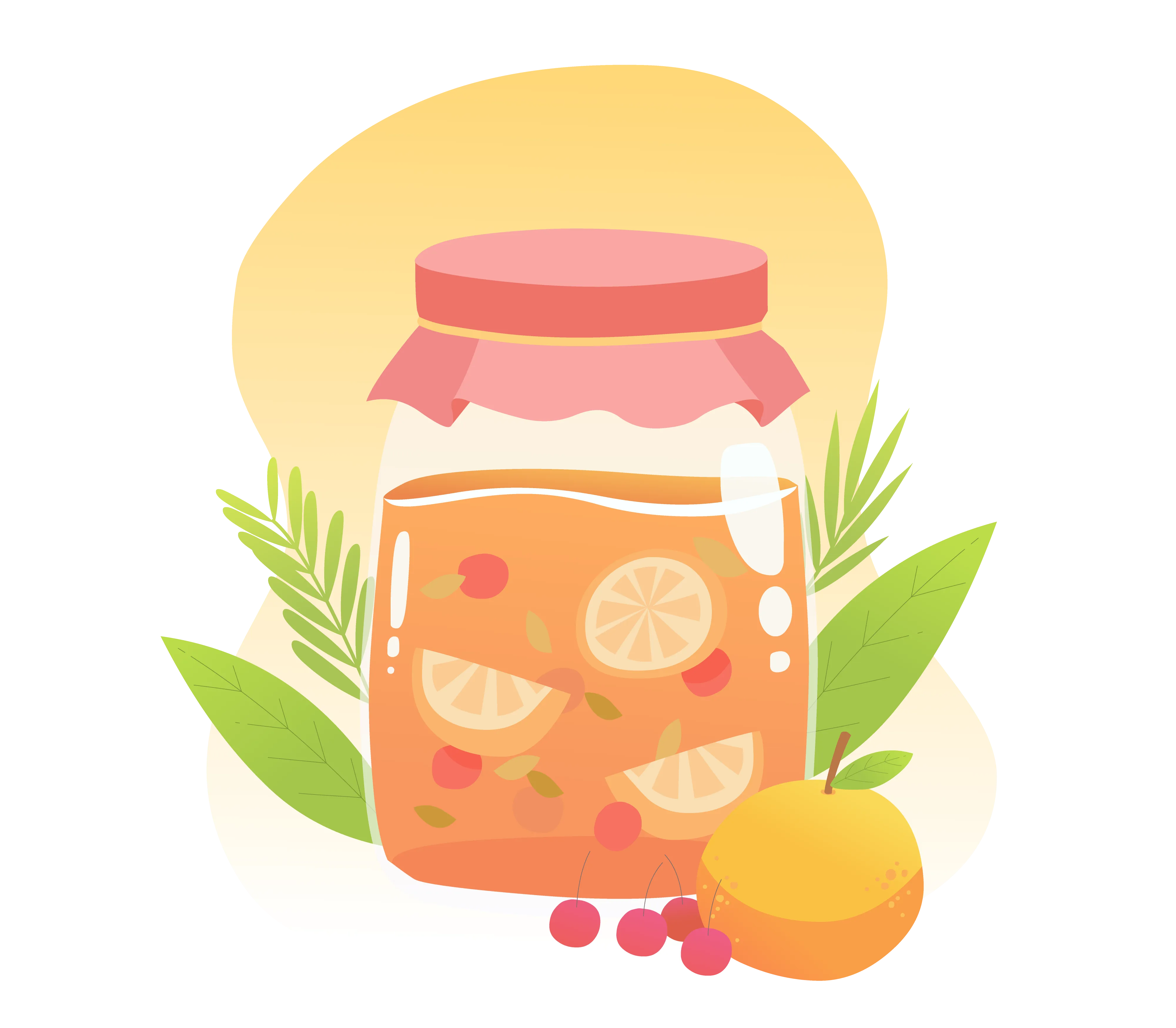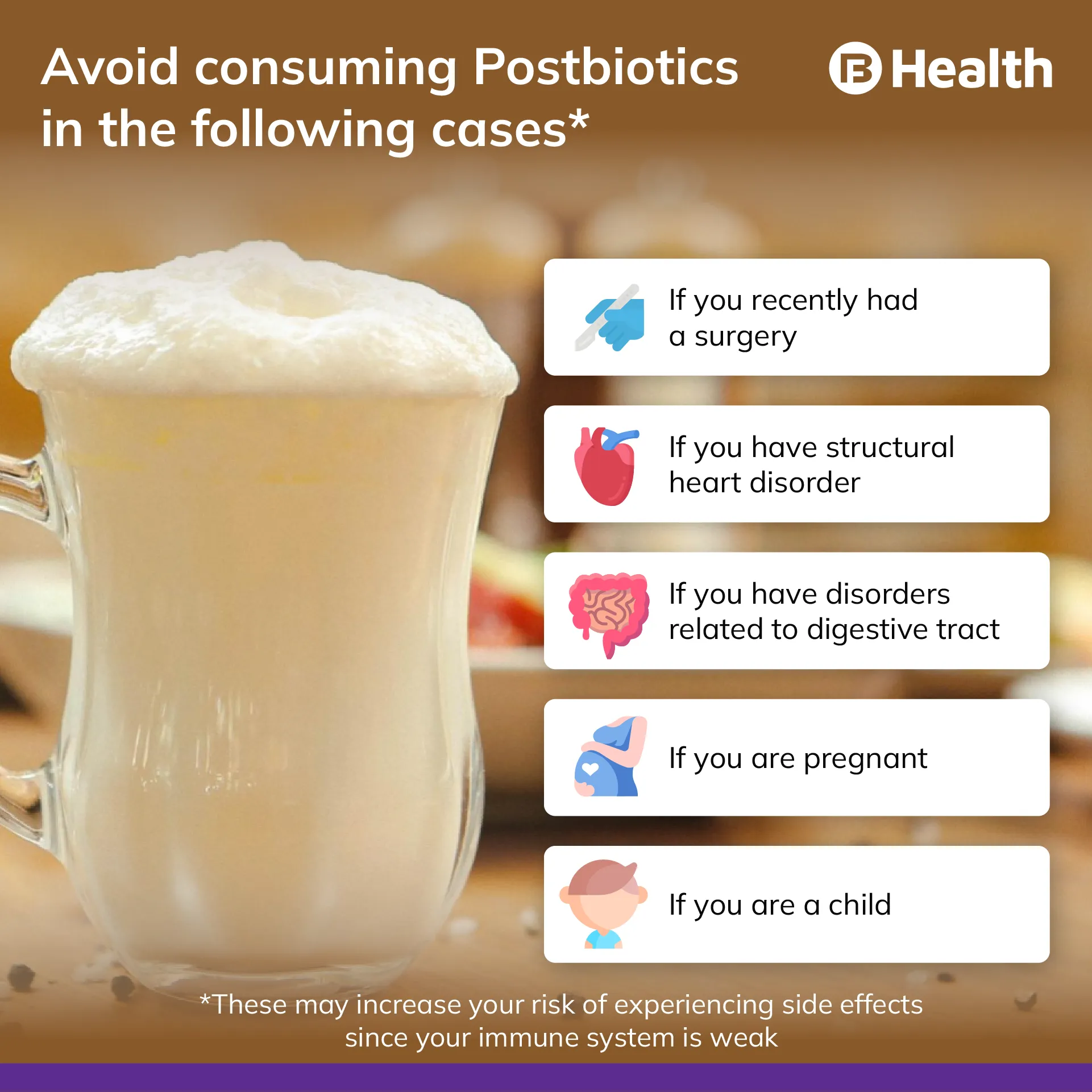Nutrition | 4 min read
5 Ways Postbiotic Benefits Your health
Medically reviewed by
Table of Content
Key Takeaways
- Postbiotic benefits your health by boosting immunity and preventing diarrhea
- There are different types of postbiotics supplements: powder, pills, or liquid
- Gas, bloating, and stomach are commonly experienced probiotics side effects
Postbiotics are bioactive components formed by microorganisms that live in your gut. Postbiotics, like prebiotics and probiotics, are good for your overall health. Though postbiotics are lesser known than the other two, they play a vital role in your gut health. To know what are postbiotic benefits, it is important to understand their formation. In simple terms, postbiotics are waste of probiotics. Some common postbiotic examples are as follows.
- Enzymes
- Bacteriocins
- Organic acids
- Carbonic substances
Read on to understand what are prebiotics, probiotics, and postbiotics and postbiotic benefits for your health.
Additional Read: Stomach Infection in KidsWhat is the difference between prebiotics, probiotics, and postbiotics?
Prebiotics
Prebiotics are present in food and are indigestible. The most common form of prebiotic is a dietary fiber that you get from supplements or foods. These help fuel the growth of good bacteria in your gut.
Probiotics
Probiotics are microorganisms that help increase good bacteria in your gut. You can get probiotics in the form of food as well as supplements. They help strengthen your body against infection. They also have anti-inflammatory and antimicrobial properties.
Postbiotics
Postbiotics are the components that form because of probiotic activity in your gut. Usually, they are the result and byproducts of the microorganisms that live in your gut. They can also be directly added with the help of supplements. Postbiotic powder, pills, or liquid are some of the best postbiotics supplements.
Though these components have unique roles to play, they share some common benefits. Improved gut health is one of the major health benefits of pre, pro, and postbiotics.
There are different types of postbiotics, some of which are
- Enzymes
- Cell wall fragments
- Shor-chain fatty acids
- Bacterial lysates
- Lipopolysaccharides
- Exopolysaccharides
- Metabolites like amino acids and vitamins
The foods that come into the categories of postbiotics are:
- Fermented pickles
- Cottage cheese
- Fibre-rich foods like garlic, flaxseed, oats, seaweed
- Kefir
- Kimchi
- Buttermilk
- Yoghurt
- Sourdough bread

How do postbiotics work
Scientists have yet to arrive at a consensus about how postbiotics work in the human body. One widely researched postbiotic butyric acid, a short-chain fatty acid present in the colon, determines the growth of bacteria in the stomach. So, one can control the number of bacteria in the gut by adding butyric acid to the stomach. A few of these bacteria are known to boost the immune response of the colon's lining. This immune response is significant given a large number of bacteria present in the colon. Research has opined that some good bacteria boost the immune system to stop bacteria from entering the bloodstream. [1] Efforts are still going on to know the role played by postbiotics in the human immune system.
What are the benefits of the postbiotic?
Metabolism is different in every individual, so the benefits of postbiotics are also different. Doctors often give patients postbiotics as medicine which contain higher doses than the bacteria could produce. Some postbiotics need to be kept in refrigeration to function properly. Postbiotics offer various health benefits, some of which are as follows:
- They may curb allergies
Recent research has said that postbiotics help control the severity of eczema, a type of skin disease, if given as supplements. [2]
- They may help in weight reduction
Postbiotics, for example, short-chain fatty acids, are said to suppress the hunger signals in the body and help people to eat in fewer amounts. This helps in the process of weight loss.
- They may cut down the risk of heart ailments
Butyrate acid is known to control the blood pressure level and repress genes which are responsible for maintaining cholesterol levels in the body.
- They may help control blood sugar level
Butyrate acid is known to help manage blood sugar in patients.
- They may prevent tumors
Some postbiotics are known to reduce the development and spread of some types of cancer cells, such as the stomach and colon.
- They may have better tolerance capacity than probiotics
Probiotics fuel up the beneficial bacteria in the body. However, they may not be digested well by everyone. So, if you are intolerant to probiotics, you can consume postbiotics.

How postbiotic improve the health?
There are many postbiotic reviews and research that talk about the benefits they have to offer. Take a look at usually how postbiotic benefits your health.
Boosts your immune system
Different postbiotics have different properties that can help strengthen your immune system. Butyrate, a probiotic, can help stimulate T cell production in your intestine. T cells play a major role in controlling your immune system’s response. Daily consumption of postbiotic supplements can help lower the risk of respiratory infection. It can also help improve the production of antibodies that help in fight infection [1].
Treats and prevent diarrhea
Postbiotics can help reduce the duration of diarrhea as well as help prevent diarrhea. This is because of the metabolic products that probiotics release. Postbiotic supplements can be more effective than probiotics at treating diarrhea [2].
Relieves digestive problems
Postbiotics like short-chain fatty acid can help relieve symptoms of digestive problems like
- Constipation
- Inflammatory bowel disease
- Crohn’s disease
- Ulcerative colitis
Butyrate helps activate immune cells that help in reducing inflammation [3].

Helps manage atopic dermatitis
Postbiotic benefits for skin include managing the symptoms of atopic dermatitis (eczema). Postbiotic supplements can help in reducing the severity of this condition [4].
Lowers blood sugar
An imbalance in the intestinal microbe can lead insulin resistance and obesity. Muramyl dipeptide, a postbiotic component can increase insulin sensitivity and relieve intolerance towards glucose [5]. Butyrate can also help in managing Type 2 diabetes.
Other than this, postbiotic benefits also include
- Weight loss
- Lower risk of heart condition
- Arrest in growth of cancer cells
- Management of allergy symptoms
- Better tolerability than probiotics
What foods are postbiotics?
If you are wondering where to buy postbiotics from, the answer is you home. Since postbiotics are a byproduct of probiotic process, foods that increase probiotics can help increase postbiotics. Here are a few foods which may help increase postbiotics in your gut.
- Fiber rich foods
- Cottage cheese
- Kefir
- Yogurt
- Kombucha
- Buttermilk
- Miso
- Fermented pickles
- Kimchi
Though postbiotics benefit your health, you may experience postbiotic side effects upon excess consumption. Here are some common postbiotic side effects.
- Stomach discomfort
- Gas
- Bloating
What are the side effects of postbiotics?
- Postbiotics are usually safe and tolerated well by a healthy individual. However, if you are taking it as a supplement to increase the level of postbiotics in your stomach, you may encounter some digestive problems like gas and bloating. These symptoms will subside once your body gets accustomed to these supplements
- People with weaker immunity should not take probiotic supplements to raise the level of postbiotics in their bodies as it may cause some adverse reactions
- Those who have recently undergone any surgery should avoid taking these supplements. Apart from this, individuals with structural heart disorders should not take them
- People with digestive tract disorders should also stay away from them
- Pregnant ladies and children should also avoid them
- It is advisable to talk to your doctor before you start any postbiotic supplement. This is especially necessary if you have any chronic health condition or are already on some medication
How to incorporate postbiotics into your diet?
Postbiotics are not easily available though you can obtain them from selected health stores offline or online. Sometimes they are available by other names such as calcium butyrate, sodium butyrate, or dried yeast.
Eating prebiotic and probiotic-rich foods can naturally increase the production of healthy bacteria in your stomach. You will get additional health benefits out of this.
Prebiotics food sources
Vegetables and whole grains are important sources of prebiotics because of their high fibre content. These include garlic, barley, onion, oats, flaxseed, asparagus etc. Some fermented foods and beverages that contain prebiotics are yoghurt, kimchi, miso, sauerkraut, kefir, kombucha, etc.
But as already mentioned, postbiotics may interfere in your system in some instances, such as for people with weak immunity or underlying health issues.
To avoid these, it is important that you talk to a doctor or nutritionist before you start adding postbiotics to your diet. Keep in mind that these help improve your health but you may still fall sick. If you see signs of an illness, contact a doctor immediately. Book an online consultation appointment on Bajaj Finserv Health. You can talk to the best nutritionists to assess what are the best postbiotics for you. You can also get answers on where to buy postbiotics and some best postbiotics supplements. Take these measures to keep your gut healthy.
References
- https://pubmed.ncbi.nlm.nih.gov/20796295/
- https://pubmed.ncbi.nlm.nih.gov/14964345/
- https://pubmed.ncbi.nlm.nih.gov/30277149/
- https://pubmed.ncbi.nlm.nih.gov/21269308/
- https://pubmed.ncbi.nlm.nih.gov/28434881/
- https://www.ncbi.nlm.nih.gov/pmc/articles/PMC3337124/
- https://www.ncbi.nlm.nih.gov/pmc/articles/PMC6517242/
Disclaimer
Please note that this article is solely meant for informational purposes and Bajaj Finserv Health Limited (“BFHL”) does not shoulder any responsibility of the views/advice/information expressed/given by the writer/reviewer/originator. This article should not be considered as a substitute for any medical advice, diagnosis or treatment. Always consult with your trusted physician/qualified healthcare professional to evaluate your medical condition. The above article has been reviewed by a qualified doctor and BFHL is not responsible for any damages for any information or services provided by any third party.





